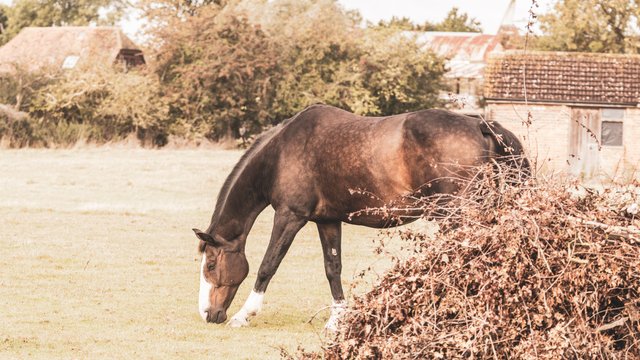It’s a curious and somewhat perplexing behavior when horses occasionally consume dirt. Horse owners and enthusiasts may witness this behavior and wonder about the reasons behind it. While it may seem odd to humans, there are several explanations as to why horses exhibit this behavior. Understanding the potential reasons behind why horses sometimes eat dirt can provide insight into their health and well-being.
The Physiology of Equine Digestion
Anatomy of the Equine Digestive System
To understand why horses sometimes eat dirt, it’s crucial to probe into the intricate anatomy of their digestive system. Horses are non-ruminant herbivores with a large hindgut fermentation chamber that aids in breaking down fibrous plant material. Unlike humans, horses have a relatively small stomach and a large cecum where microbial fermentation occurs.
Nutritional Requirements of Horses
Equine nutrition is a complex topic that directly impacts a horse’s overall health and well-being. Horses require a balanced diet consisting of forage, such as hay or pasture, and supplemental feed to meet their nutritional needs. Key nutrients crucial for horses include protein, carbohydrates, fats, vitamins, and minerals.
Equine diets must be tailored to an individual horse’s age, weight, activity level, and overall health to ensure optimal performance and prevent health issues. It is crucial to work with a veterinarian or equine nutritionist to develop a customized feeding plan that meets the specific needs of each horse.
Behavioral Factors Influencing Dirt Consumption
It is imperative to consider the behavioral factors that may influence a horse to eat dirt. This behavior can be a result of various factors, including boredom, stress relief, and habitual behaviors. Understanding these factors can help horse owners address the issue effectively.
- Boredom and Environmental Enrichment
- Habitual Behaviors and Stress Relief
Boredom and Environmental Enrichment
One common reason why horses may consume dirt is due to boredom. When horses are kept in environments with limited stimulation or opportunities for natural behaviors like grazing, they may turn to eating dirt out of sheer boredom. Providing environmental enrichment such as toys, varied terrain, and social interaction can help curb this behavior.
Habitual Behaviors and Stress Relief
For horses, engaging in habitual behaviors such as cribbing or weaving can be a way to alleviate stress. Eating dirt can also fall into this category as a coping mechanism for stress. Recognizing and addressing the underlying stressors in a horse’s environment is crucial in preventing them from seeking relief in harmful behaviors like dirt consumption. If you are concerned about your horse’s behavior, it is recommended to consult with a veterinarian or equine behavior specialist. You can also learn more about geophagia causes and solutions in the article “Why is My Horse Eating Soil? – Geophagia Causes & Solutions“.
Health-Related Causes of Geophagia in Horses
Mineral Deficiencies and Diet Imbalance
Diet plays a vital role in preventing geophagia in horses. Mineral deficiencies, particularly in necessary nutrients like salt, phosphorus, and trace minerals, can drive horses to seek out dirt for supplementation. Imbalances in a horse’s diet, such as excessive consumption of one type of feed or deficiency in another, can also trigger geophagia. It is crucial for horse owners to work closely with veterinarians or equine nutritionists to ensure a well-balanced diet tailored to their horse’s specific needs.
Gastrointestinal Health and Parasite Load
Gastrointestinal health and parasite load are significant factors that can lead to geophagia in horses. Issues like ulcers, colic, or an overabundance of parasites can cause discomfort, leading horses to consume dirt as a way to alleviate symptoms. Regular veterinary check-ups, proper deworming protocols, and a well-managed feeding program are necessary in maintaining optimal gastrointestinal health and reducing the risk of geophagia.
Health-Related Causes of Geophagia in horses encompass various factors ranging from diet deficiencies to parasite load. Recognizing and addressing these issues promptly can help prevent horses from engaging in this potentially harmful behavior.
Management and Prevention Strategies
Diet and Nutrition Optimization
Nutrition plays a significant role in the overall health and behavior of horses. Ensuring that your horse’s diet is balanced and provides all the necessary nutrients can help prevent them from seeking out dirt as a supplement to their diet. Consult with a veterinarian or equine nutritionist to develop a well-rounded feeding plan tailored to your horse’s specific needs.
Environmental and Behavioral Modifications
One key aspect of managing and preventing dirt-eating behavior in horses is to assess their living environment. Ensure that your horse has access to clean water at all times and that their living area is free of toxins or contaminants that may prompt them to consume dirt. Providing ample opportunities for grazing or turnout can also help reduce the likelihood of this behavior.
Another important consideration is to address any underlying behavioral issues that may be driving your horse to eat dirt. Boredom, stress, or dietary deficiencies can all contribute to this behavior, so it’s crucial to provide mental and physical stimulation for your horse through regular exercise, social interaction, and environmental enrichment.
Conclusion
Upon reflecting on the reasons why horses sometimes eat dirt, it becomes clear that several factors such as nutritional deficiencies, behavioral issues, intestinal discomfort, and boredom can contribute to this unusual behavior. By addressing these underlying issues through proper diet, environmental enrichment, and veterinary care, horse owners and caretakers can help prevent horses from consuming dirt and maintain their overall well-being.
